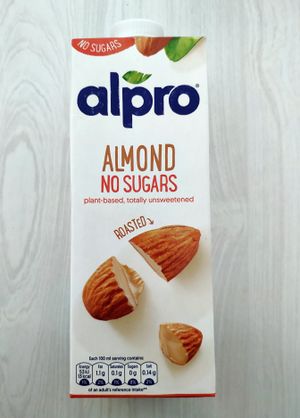Vegan diet
This article is a stub. |

A vegan diet, sometimes called a plant-based diet, consists solely of plants and foods made from non-animal sources.[1] Any food that comes from animal sources, such as meat, eggs, dairy or honey, is excluded.[1]
Theory
A vegan or plant-based diet can be helpful for people with food sensitivities which are common in ME/CFS, for example lactose intolerance, egg or dairy allergies, because these foods are excluded from vegan diets.[1] It is not necessary to eat any particular food, making it suitable for people with soya, nut or other allergies.
A review of dietary studies found that "biomarkers of inflammation were almost all meat-based or "Western" patterns", and the opposite was true for diets rich in fruit and vegetables that did not include meat.[2]
Evidence for a vegan diet
General effects
A balanced vegan diet is suitable for people of age any.[3] A survey of people who went vegan for one month found that 66% reported noticing health benefits, 60% of those reported having more energy and over half reported improved mood or weight benefits.[4]
Plant-based or vegan diets also reduce the risk of many chronic diseases, including ischaemic heart disease, type 2 diabetes, obesity and high blood pressure.[5]
Chronic fatigue syndrome
Fibromyalgia
A study of 15 patients with fibromyalgia found a low-salt raw vegan diet improved many symptoms.[6]
Costs and availability
Foods suitable for a healthy vegan diet are available anywhere in the world and include fruit, vegetables, lentils, beans including soya products, grains including bread products, nuts and seeds.[7] Many ready meals are not suitable for people following a vegan diet; some vegan and vegetarian companies as well as some supermarket chains produce vegan ready meals or specialist vegan products although availability is limited in some areas.[7]
Notable studies
- 2000, Vegan diet alleviates fibromyalgia symptoms[6] (Full)
- 2013, Dietary pattern analysis and biomarkers of low-grade inflammation: a systematic literature review[2] (Abstract)
- 2016, Plant-based diets: A physician's guide[5] (Full)
Clinical use
Learn more
- Vegan Society
- Veganuary - try vegan for a month
- Health Benefits of Plant-based Diets: Science Reports on Vegans & Vegetarians
- Plant-based diets - British Dietician Association
- NHS Live Well - The vegan diet
- Wikipedia - Veganism
- -Nutrition - The Vegan Society
See also
References
- ↑ 1.0 1.1 1.2 "The Vegan Society". The Vegan Society. Retrieved November 16, 2018.
- ↑ 2.0 2.1 Barbaresko, Janett; Koch, Manja; Schulze, Matthias B.; Nöthlings, Ute (August 2013). "Dietary pattern analysis and biomarkers of low-grade inflammation: a systematic literature review". Nutrition Reviews. 71 (8): 511–527. doi:10.1111/nure.12035. ISSN 1753-4887. PMID 23865797.
- ↑ British Dietician Association. "British Dietician Association confirms vegan diet can support healthy living in people of all ages". Retrieved November 16, 2018.
- ↑ Veganuary. "Veganuary 2018: the results are in! - Veganuary". Veganuary. Retrieved November 16, 2018.
66% of respondents reported improvements to their health, including energy levels (60%), mood (57%), body weight (52%) and better skin appearance (49%)
- ↑ 5.0 5.1 Hever, Julieanna (2016). "Plant-Based Diets: A Physician's Guide". The Permanente Journal. 20 (3): 93–101. doi:10.7812/TPP/15-082. ISSN 1552-5767. PMC 4991921. PMID 27400178.
- ↑ 6.0 6.1 Kaartinen, K; Lammi, M; Hypen, M (January 2000). "Vegan diet alleviates fibromyalgia symptoms". Scandinavian Journal of Rheumatology. 29 (5): 308–313. doi:10.1080/030097400447697. ISSN 0300-9742.
- ↑ 7.0 7.1 British Dietician Association. "Plant-based diets" (PDF). Retrieved November 16, 2018.

